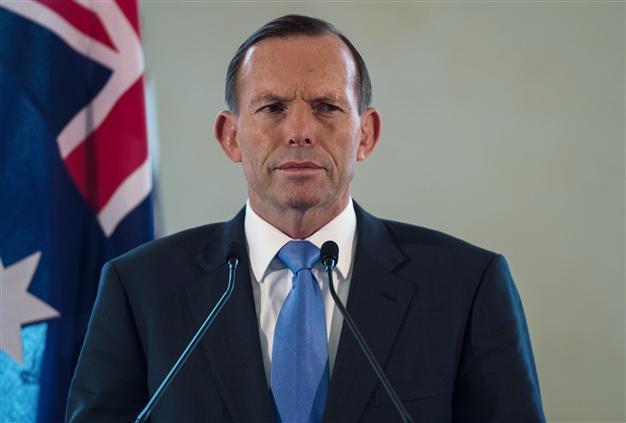Australian PM governs from tent as he keeps vow to Aborigines
SYDNEY - Agence France-Presse

Australian Prime Minister Tony Abbott listens to questions from journalists during a joint press conference. AFP Photo
Australian Prime Minister Tony Abbott shifted his office to a tent in an isolated Aboriginal community Monday, keeping a promise made when he came to power despite having just committed troops to the fight against Islamic State.Abbott vowed to spend a week each year in a remote indigenous location when he was sworn in 12 months ago, seeking to be the "prime minister for Aboriginal affairs".
He made good on his commitment by moving the hub of government to a tent compound on the outskirts of Nhulunbuy on the northern tip of Australia, nearly 1,000 kilometres (620 miles) east of Darwin.
Despite the remote location, he said he would stay in close contact with Canberra and had access to secure communications to do so.
"Obviously, if there are dramatic new developments I can move if needs be," he said during a round of morning radio and television interviews, a day after committing 600 troops to a multinational strike force against Islamic State militants in Iraq and Syria.
The decision to join the anti-IS campaign came just days after Canberra lifted its terror alert level to "high" on growing concern about Australian jihadists returning from fighting in the Middle East.
Aborigines, who number about 500,000 of a total population of 23 million, are the most disadvantaged Australians, suffering disproportionate levels of disease, imprisonment and social problems as well as lower educational attainment, employment and life expectancy.
They are believed to have numbered around one million at the time of British settlement two centuries ago.
Abbott, who used to volunteer in indigenous communities before becoming prime minister, said he wanted to give Aborigines his full attention "to gain a better understanding of the needs of people living and working in those areas".
"I am very serious, the government is very serious, both sides of politics are very serious about an indigenous recognition referendum," he said.
Australian lawmakers formally recognised indigenous peoples as the country's first inhabitants last year, five years after an historic apology to Aborigines for past wrongs.
There are now plans for a referendum to recognise Aboriginal people, and their rights, in the constitution.
"I think we're all in favour of doing the right thing by Aboriginal people and the point I make is that the right constitutional change will complete our constitution rather than change it as such," Abbott said.
"The important thing now is to set a timetable for this... It's more important that we get it right than we rush it, because the last thing anyone ought to want is to put a proposal of this nature to the people and have it fail."
He added that part of his task this week was "to try to build a consensus for change; change that does help lift Aboriginal people, that does help to ensure that never again do the first Australians feel like strangers in their own country".
Indigenous Affairs Minister Nigel Scullion, who is camping with Abbott, told reporters that 2017 was the government's pick for a vote to include indigenous Australians in the constitution.
He said next year was too soon and 2016 clashed with the next federal election.
If held in three years, it would mark 50 years since indigenous people were officially given the right to vote.
















